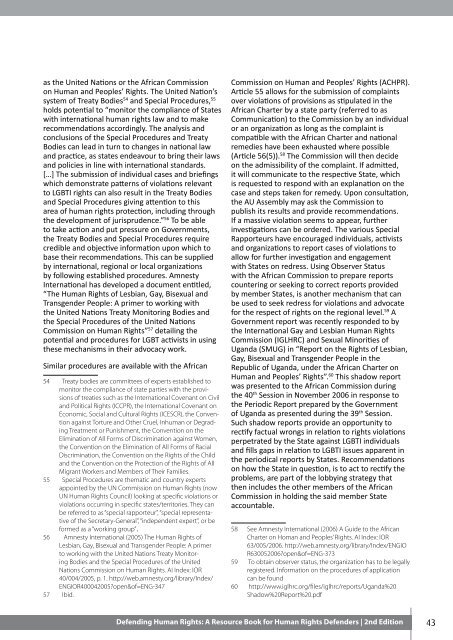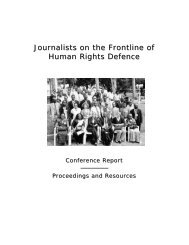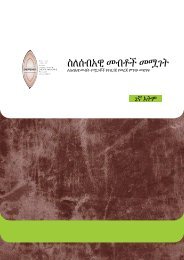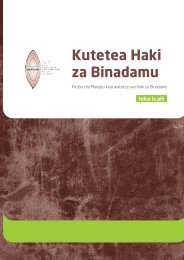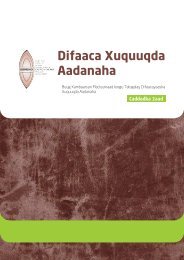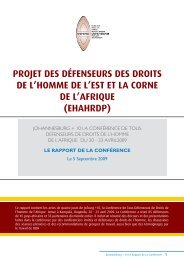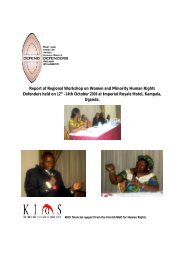Defending Human Rights: A Resource Book for Human
Defending Human Rights: A Resource Book for Human
Defending Human Rights: A Resource Book for Human
You also want an ePaper? Increase the reach of your titles
YUMPU automatically turns print PDFs into web optimized ePapers that Google loves.
as the United Nations or the African Commission<br />
on <strong>Human</strong> and Peoples’ <strong>Rights</strong>. The United Nation’s<br />
system of Treaty Bodies 54 and Special Procedures, 55<br />
holds potential to “monitor the compliance of States<br />
with international human rights law and to make<br />
recommendations accordingly. The analysis and<br />
conclusions of the Special Procedures and Treaty<br />
Bodies can lead in turn to changes in national law<br />
and practice, as states endeavour to bring their laws<br />
and policies in line with international standards.<br />
[…] The submission of individual cases and briefings<br />
which demonstrate patterns of violations relevant<br />
to LGBTI rights can also result in the Treaty Bodies<br />
and Special Procedures giving attention to this<br />
area of human rights protection, including through<br />
the development of jurisprudence.” 56 To be able<br />
to take action and put pressure on Governments,<br />
the Treaty Bodies and Special Procedures require<br />
credible and objective in<strong>for</strong>mation upon which to<br />
base their recommendations. This can be supplied<br />
by international, regional or local organizations<br />
by following established procedures. Amnesty<br />
International has developed a document entitled,<br />
“The <strong>Human</strong> <strong>Rights</strong> of Lesbian, Gay, Bisexual and<br />
Transgender People: A primer to working with<br />
the United Nations Treaty Monitoring Bodies and<br />
the Special Procedures of the United Nations<br />
Commission on <strong>Human</strong> <strong>Rights</strong>” 57 detailing the<br />
potential and procedures <strong>for</strong> LGBT activists in using<br />
these mechanisms in their advocacy work.<br />
Similar procedures are available with the African<br />
54 Treaty bodies are committees of experts established to<br />
monitor the compliance of state parties with the provisions<br />
of treaties such as the International Covenant on Civil<br />
and Political <strong>Rights</strong> (ICCPR), the International Covenant on<br />
Economic, Social and Cultural <strong>Rights</strong> (ICESCR), the Convention<br />
against Torture and Other Cruel, Inhuman or Degrading<br />
Treatment or Punishment, the Convention on the<br />
Elimination of All Forms of Discrimination against Women,<br />
the Convention on the Elimination of All Forms of Racial<br />
Discrimination, the Convention on the <strong>Rights</strong> of the Child<br />
and the Convention on the Protection of the <strong>Rights</strong> of All<br />
Migrant Workers and Members of Their Families.<br />
55 Special Procedures are thematic and country experts<br />
appointed by the UN Commission on <strong>Human</strong> <strong>Rights</strong> (now<br />
UN <strong>Human</strong> <strong>Rights</strong> Council) looking at specific violations or<br />
violations occurring in specific states/territories. They can<br />
be referred to as “special rapporteur”, “special representative<br />
of the Secretary-General”, “independent expert”, or be<br />
<strong>for</strong>med as a “working group”.<br />
56 Amnesty International (2005) The <strong>Human</strong> <strong>Rights</strong> of<br />
Lesbian, Gay, Bisexual and Transgender People: A primer<br />
to working with the United Nations Treaty Monitoring<br />
Bodies and the Special Procedures of the United<br />
Nations Commission on <strong>Human</strong> <strong>Rights</strong>. AI Index: IOR<br />
40/004/2005, p. 1. http://web.amnesty.org/library/Index/<br />
ENGIOR400042005open&of=ENG-347<br />
57 Ibid.<br />
Commission on <strong>Human</strong> and Peoples’ <strong>Rights</strong> (ACHPR).<br />
Article 55 allows <strong>for</strong> the submission of complaints<br />
over violations of provisions as stipulated in the<br />
African Charter by a state party (referred to as<br />
Communication) to the Commission by an individual<br />
or an organization as long as the complaint is<br />
compatible with the African Charter and national<br />
remedies have been exhausted where possible<br />
(Article 56(5)). 58 The Commission will then decide<br />
on the admissibility of the complaint. If admitted,<br />
it will communicate to the respective State, which<br />
is requested to respond with an explanation on the<br />
case and steps taken <strong>for</strong> remedy. Upon consultation,<br />
the AU Assembly may ask the Commission to<br />
publish its results and provide recommendations.<br />
If a massive violation seems to appear, further<br />
investigations can be ordered. The various Special<br />
Rapporteurs have encouraged individuals, activists<br />
and organizations to report cases of violations to<br />
allow <strong>for</strong> further investigation and engagement<br />
with States on redress. Using Observer Status<br />
with the African Commission to prepare reports<br />
countering or seeking to correct reports provided<br />
by member States, is another mechanism that can<br />
be used to seek redress <strong>for</strong> violations and advocate<br />
<strong>for</strong> the respect of rights on the regional level. 59 A<br />
Government report was recently responded to by<br />
the International Gay and Lesbian <strong>Human</strong> <strong>Rights</strong><br />
Commission (IGLHRC) and Sexual Minorities of<br />
Uganda (SMUG) in “Report on the <strong>Rights</strong> of Lesbian,<br />
Gay, Bisexual and Transgender People in the<br />
Republic of Uganda, under the African Charter on<br />
<strong>Human</strong> and Peoples’ <strong>Rights</strong>”. 60 This shadow report<br />
was presented to the African Commission during<br />
the 40 th Session in November 2006 in response to<br />
the Periodic Report prepared by the Government<br />
of Uganda as presented during the 39 th Session.<br />
Such shadow reports provide an opportunity to<br />
rectify factual wrongs in relation to rights violations<br />
perpetrated by the State against LGBTI individuals<br />
and fills gaps in relation to LGBTI issues apparent in<br />
the periodical reports by States. Recommendations<br />
on how the State in question, is to act to rectify the<br />
problems, are part of the lobbying strategy that<br />
then includes the other members of the African<br />
Commission in holding the said member State<br />
accountable.<br />
58 See Amnesty International (2006) A Guide to the African<br />
Charter on Homan and Peoples’ <strong>Rights</strong>. AI Index: IOR<br />
63/005/2006. http://web.amnesty.org/library/Index/ENGIO<br />
R630052006open&of=ENG-373<br />
59 To obtain observer status, the organization has to be legally<br />
registered. In<strong>for</strong>mation on the procedures of application<br />
can be found<br />
60 http://www.iglhrc.org/files/iglhrc/reports/Uganda%20<br />
Shadow%20Report%20.pdf<br />
<strong>Defending</strong> <strong>Human</strong> <strong>Rights</strong>: A <strong>Resource</strong> <strong>Book</strong> <strong>for</strong> <strong>Human</strong> <strong>Rights</strong> Defenders | 2nd Edition 43


